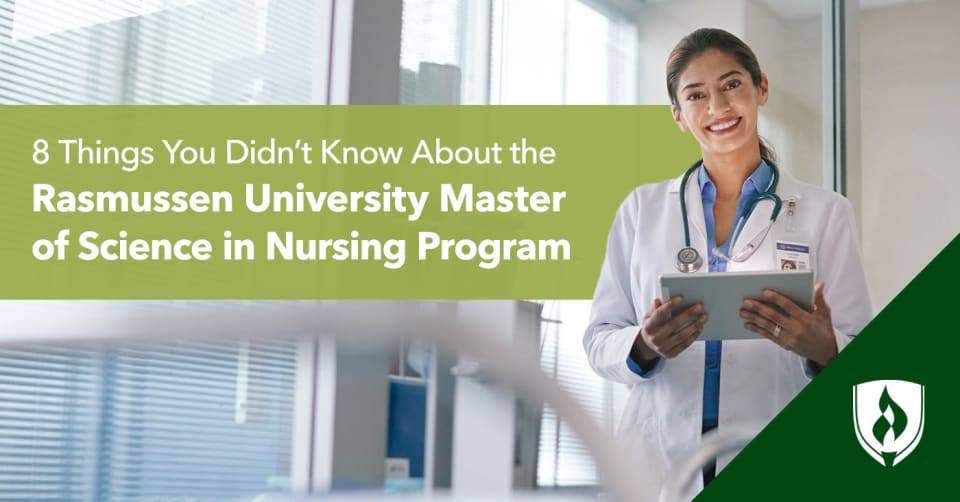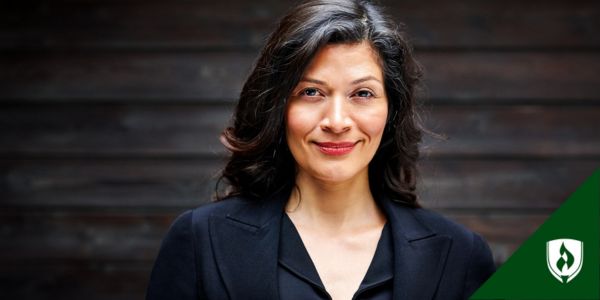8 Things You Didn't Know About the Rasmussen University Master of Science in Nursing Program
By Will Erstad on 08/13/2020

Thinking back on the sense of excitement (and relief) you likely felt during your last graduation ceremony, it may seem hard to believe you’re thinking of making a comeback.
You’ve spent some time serving in your scrubs for a while now, acquiring invaluable experience and improving countless patients’ lives. You’re ready to amplify your impact and take the next step in your nursing career by earning a Master of Science in Nursing (MSN) degree.
You know what you want, and you know advancing your education will help you get there. This is why you’re conducting thoughtful research to identify the program that best meets your needs.
If one of the Rasmussen University MSN specializations is on your consideration list, you came to the right place. Keep reading to get a better idea of what this program can offer you.
8 Notable facts about the Rasmussen University Master of Science in Nursing programs
Before entrusting a school with such an important role in your future, it’s imperative that you learn everything you can about the program and its offerings. To help you in your research, we compiled the most important information about our program all in one place.
1. The Rasmussen University MSN program is accredited by the Commission on Collegiate Nursing Education (CCNE)1
Accreditation for your MSN is just as important as it was for your BSN. This third-party validation can give you peace of mind knowing that the program you’re working through is a quality one and can prepare you for your future.
“Earning accreditation through the CCNE is a rigorous process that supports and encourages continuing self-assessment and growth of the program,” says Dr. Joan Rich, vice president of Nursing at Rasmussen University.
2. Select MSN programs can be completed in as a few as 18 months2
If you’re ready to buckle down and invest the time and energy into advancing your nursing education, why wait? Earning a master’s degree doesn’t have to be a long, drawn-out process. Rasmussen University offers courses year-round, so your next possible start date is always just around the corner. Depending on the MSN program specialization you enroll in, you can complete your MSN degree in as few as 18 to 27 months.2
3. Many MSN courses are offered fully online
Rasmussen University understands that you’re a busy nursing professional with plenty on your plate on any given day. That’s why our competency-based MSN classes are offered to you fully online, so you can fit your classwork into your own schedule.
Online courses offer flexibility for completing your coursework, since we all know nursing schedules don’t always fit into the typical 9-to-5 routine. This added flexibility doesn’t mean the program will be a breeze—you will still be pushed to grow with a curriculum that is both enriching and challenging. However, you should feel confident that you’ll be able to carve out time for school each week without having to worry about driving to campus or dealing with scheduling conflicts.
4. Non-clinical MSN program offerings can be completed for under $15,0003
It’s perfectly understandable if the price of completing an MSN program looms large in your mind. You’ve likely invested a significant amount into your education up to this point and adding to that total is something worth careful consideration.
Fortunately, Rasmussen University’s non-clinical MSN programs are offered at a cost—just under $15,000—that can make this deliberation a little easier.3 This price point provides working nurses like you an attainable option for taking the next step in your career. It should be noted that, , this does not apply to the Nurse Practitioner programs.
5. The MSN curriculum is designed and administered by seasoned nursing professionals
Every faculty member in the Rasmussen University MSN program holds a doctoral credential, meaning you’ll be learning from seasoned professionals who have climbed the ranks of the healthcare industry. The practical knowledge and mentoring you’ll receive from these instructors will help you develop the skills needed to influence the future of nursing.
In fact, the program itself was developed by nurses who know what it’s like to earn an advanced degree while working and juggling family and personal demands. This is why our team designed an innovative and progressive curriculum that allows you to graduate and pursue the next step in your nursing career sooner.
6. You can choose from several non-clinical specialized paths
The Rasmussen University MSN program offers several distinct focus areas for RNs looking to advance their education:
- Nursing Leadership and Administration
- Nursing Education
- Healthcare Technology, Simulation and Informatics
The Nursing Leadership and Administration specialization is a perfect fit for ambitious RNs who are hungry to take on more responsibility and help drive change in their organization and profession. The curriculum in this program emphasizes the business side of nursing, helping you acquire skills in leadership, management, administration and interdisciplinary collaboration.
Students in this specialization will learn to interpret health informatics data and apply ethical frameworks to decisions that have a tangible effect on patient outcomes. Additionally, you will gain the tools necessary to lead front-line nurses and make a greater impact on today’s dynamic healthcare landscape.
The Nursing Education specialization will prepare you to become one of the qualified nursing educators the industry desperately needs. With courses focusing on leadership within the educational setting, transformational learning, curriculum design and teaching strategies, you’ll be well-equipped to help develop and empower the next generation of nursing professionals.
The Healthcare Technology, Simulation and Informatics specialization puts a focus on the ways technology is changing the nursing field and how you can help lead that evolution.
The rise of electronic health records, telehealth and nursing simulation tools has opened a new frontier within nursing, and facilities need the perspective of experienced nurses when designing and implementing these systems. Students in this specialization will learn more about the technology driving nursing informatics and telehealth systems and how nurses can use their specialized know-how to refine and improve them.
Additionally, nursing training and development initiatives are undergoing a shift as they can now draw from a growing field of simulation technologies to provide educational opportunities that otherwise wouldn’t be feasible. That includes harnessing tools like virtual reality and simulation labs to provide simulated training experiences.
7. Nurse Practitioner offerings provide a path to advanced practice nursing
Advanced practice nursing is a growing segment of the healthcare field. In fact, the Bureau of Labor Statistics projects employment of nurse practitioners to grow 52 percent from 2020 through 2030.4 That’s one of the fastest-growing occupations in the country, and healthcare providers are increasingly turning to advanced practice providers like nurse practitioners to meet the country’s healthcare needs.4
Students have the choice to focus their studies in one of four key areas:
- Psychiatric-Mental Health Nurse Practitioner
- Adult-Gerontology Primary Care Nurse Practitioner
- Pediatric Primary Care Nurse Practitioner
- Family Nurse Practitioner
All of these MSN Nurse Practitioner options feature flexible competency-based online coursework, in-person practicum work and the immersive clinical experiences needed to develop your expertise as an advanced practice nurse with these specific patient populations. Upon completion, graduates are prepared to sit for the essential certification exams needed to get started as an NP.
8. Student support services position you for success
Returning to school undoubtedly takes some adjustment, but that doesn’t mean you’ll have to go it alone. Whether you need a refresher on how to properly format citations, help troubleshooting technical issues or tips for your upcoming career search, Rasmussen University offers a variety of helpful student resources to help ensure your graduate education experience is a success. Pair this with the dedicated support of faculty, advisors and practicum coordinators and you’ll take the next step in your nursing education with confidence.
An MSN program built for you
You know you need to further your nursing education in order to achieve your aspirations. But you also know you can’t afford to put your career or life on hold to do that. With the Rasmussen University MSN program, you don’t have to sacrifice one for the other.
If you’re ready to put in the work toward earning an advanced nursing degree, you need a program that’s willing to work for you. To learn more about how we can help you take the next step, check out the Master of Science in Nursing page.
Related Articles:
1The Master of Science in Nursing degree program at Rasmussen University is accredited by the Commission on Collegiate Nursing Education l 655 K Street NW, Suite 750 l Washington, DC 20001 l 202-887-6791
2Completion time is dependent on the number of courses completed each term. 18-month completion time does not apply to MSN Nurse Practitioner programs.
3Tuition for MSN program is $260 per credit; excludes MSN Nurse Practitioner specializations. Students in all programs must maintain continuous enrollment to remain eligible for the tuition pricing of $260 per credit. A student who withdraws and re-enrolls will be required to pay the tuition price offered at the time of their re-enrollment. MSN students who receive the tuition price of $260 per credit may be eligible to use additional discounts, grants and/or scholarships. If a student needs to retake one or more courses in the degree program, the total cost of the program will exceed $15,000. MSN (excluding Nurse Practitioner specializations) Program cost breakdown: $12,480 in tuition + $2,460 in fees = $14,940 in program cost. MPH Program cost breakdown: $11,480 in tuition + $2,870 in fees = $14,350 in program cost. Program availability varies by campus and state; please see the Rasmussen University Catalog for details.
4Bureau of Labor Statistics, U.S. Department of Labor, Occupational Outlook Handbook, [accessed May 2022] https://www.bls.gov/ooh/healthcare/nurse-anesthetists-nurse-midwives-and-nurse-practitioners.htm#tab-6. Information represents national, averaged data for the occupations listed and includes workers at all levels of education and experience. This data does not represent starting salaries. Employment conditions in your area may vary.
EDITOR’S NOTE: This article was originally published in 2017. It has since been updated to include information relevant to 2022.




